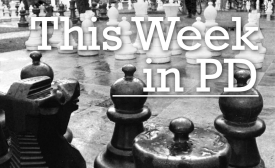nationalism

PD News headlines showcased the role public opinion can play in international politics.
China has been making major efforts to increase its ability to influence other countries without force or coercion. [...] China has emphasized its cultural and economic strengths, but it has paid less attention to the political aspects that can undermine its efforts.
At the start of 2015, after a year of increased political and military tension growing in several parts of the world, including Europe, as well as the fundamentalist attacks in Paris, it is relevant to look at its implications for higher education.
While American patriotism -- the love of one's country -- is "awesome" in more ways than one, American nationalism -- the belief that America is the "greatest nation on earth," with the "greatest military power", and the "greatest ideals" -- can become dangerous, and even turn Messianic. The American establishment has been drilling these nationalist slogans, whether mythical or real, into the American mind for decades.
Twenty-five years ago the Berlin Wall fell, and most Central European states went on to join the North Atlantic Treaty Organization (NATO) and the European Union (EU). Now that we are addressing urgent challenges in the Middle East, Ukraine, Africa, and Asia, shouldn’t U.S. public diplomacy efforts be transferred from Central Europe to these hotspots?
With scarce PD resources, can the U.S. afford to invest in Central Europe? It can't afford not to, argue Caitlin Bergin and Mieczyslaw Boduszynski.
The government has ordered TV stations to increase the airing of “patriotic” shows, of which anti-Japan dramas are exhibit No. 1. On Aug. 15, the anniversary of Japan’s surrender, a headline in the Global Times, a party newspaper, said, “Prime time TV to be more anti-fascist.” China has a long tradition of producing war movies for propaganda purposes, mostly good-versus-evil dramas drawn from the all-too-real and brutal war against Japan.







